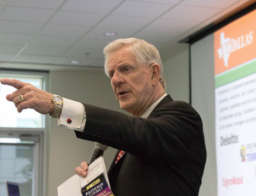
Corporate governance is often described as relying on a triangle that consists of a company’s shareholders, its board of directors and management. But other key stakeholders — employees, suppliers, activists, media, government regulators — also formally or informally determine a board’s dynamics. A slate of speakers gathered at The University of Texas at Dallas to discuss various aspects of those interactions at the 15th Annual Corporate Governance Conference, “Relationships in a Fractured World.”
Presented by the Institute for Excellence in Corporate Governance (IECG), the conference attracted an audience of 150, including several CEOs and 15 faculty members of the Naveen Jindal School of Management, where the April 12 all-day event was held.
“When directors are asked to name their primary concern, studies show they are most likely to point to uncertainty in the political and economic sectors,” said Dennis McCuistion, clinical professor and executive director of the institute. “That’s what I mean by a fractured world. With trade issues, an overblown stock market and underblown profits, rising interest rates, regulatory compliance issues — roll in diversity on top of all that and you’ve got a fine set of circumstances — and a great backdrop for our conference.”
Robert Hall, an expert on relationships and author of This Land of Strangers: The Relationship Crisis That Imperils Home, Work, Politics, and Faith (Austin, Texas, Greenleaf Book Group Press, 2012), delivered the keynote presentation, “Relational Risk: How New Stakeholder Demands Threaten Corporate Boards.” He explained that a technologically focused society requires strategic relational leadership focused on engagement to reach stakeholders who are increasingly isolated in their relationships.
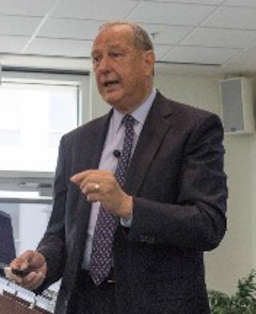
Cumulatively, home, work, political and religious isolation lead to what Hall called “relationship decline” which impacts corporate boards by making engagement with stakeholders that much more difficult for their members.
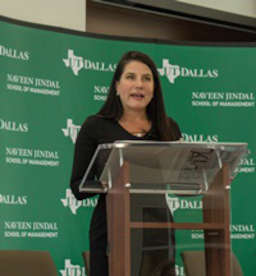
Danielle DiMartino Booth, formerly a financial journalist with the Dallas Morning News and advisor to the Dallas Federal Reserve Bank of Dallas, expounded on her book, Fed Up: An Insider’s Take on Why the Federal Reserve is Bad for America (New York: Portfolio Penguin, 2017). She laid out her case for “not ending, but upending” the Federal Reserve Board — the central banking system of the United States — whose policies she believes are undermining the nation’s economic stability.
“Though blasphemy to some, maybe the time is upon us to invite less financialization and more investment,” she said. “[We should] ask the central bankers of the world, who have assumed more power than any politician, to step aside and allow the business cycle to go back to being cyclical.”
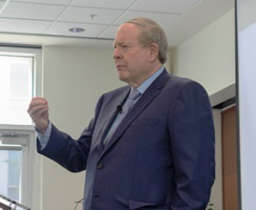
Stephen T. Winn, chairman of the board and chief executive officer of RealPage, spoke about his experience assembling the board of directors for RealPage, which he founded, and Computer Language Research Inc., the company his father founded. Both started as private companies that went public.
When asked whether, as a CEO, the feedback he got from the board changed after the company went public, he emphatically stated there was no change and that preparation was the key.
“We [already] had that governance in place,” he said. “They might not like me because of my personality — I don’t have a personality. All I think about is how we create shareholder value. That’s why they like me — [you have to be] be extraordinarily well-prepared when you go to the board.”
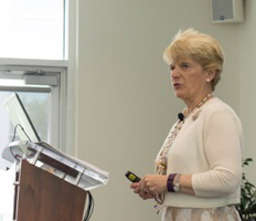
Deborah L. DeHaas, vice chairman, chief inclusion officer and national managing partner, Center for Board Effectiveness for Deloitte, discussed the importance of increasing the diversity of corporate boards, which she said have been characterized as still being too “pale, male and stale.”
“It’s going to take intentional action in planning for a board’s succession in every bit the same way that we do for the CEO and other key executives,” she said, the keys being in “challenging the status quo and challenging the sources of where you find that diversity.”
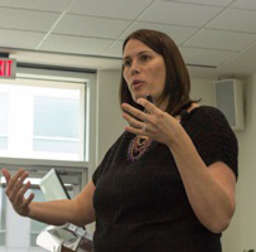
Dr. Rebecca Files, Sydney Hicks Faculty Fellow and associate professor of accounting, rounded out the event by providing some preliminary findings of the“CEO Survey-Private Company Corporate Governance,” a research study being conducted by the IECG to determine how private companies are governed.





